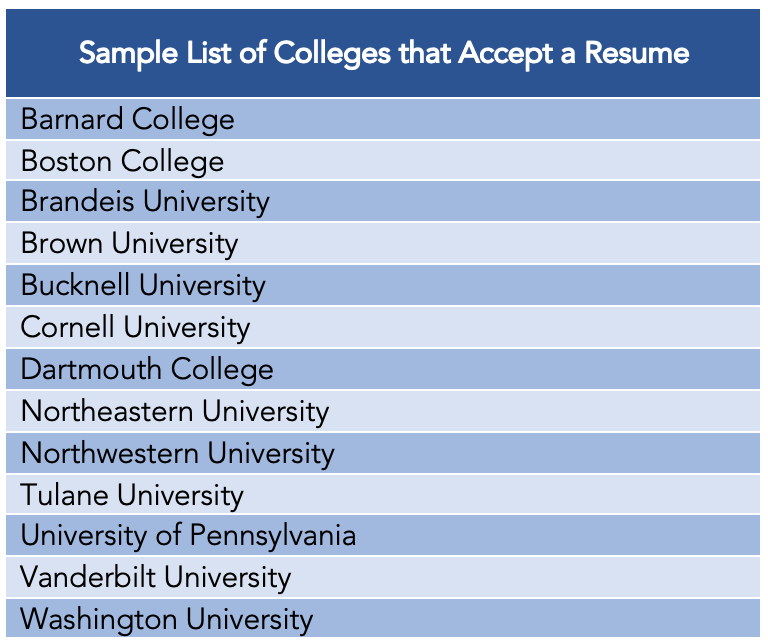 The resume is an important part of the college admissions process; it allows you to describe your extracurricular activities in great detail and helps colleges learn more about your interests and values. Also, the resume can be helpful preparation for completing the Activity Sheet of the Common Application and participating in college interviews. You may even use your resume to apply for summer internships or academic programs!
The resume is an important part of the college admissions process; it allows you to describe your extracurricular activities in great detail and helps colleges learn more about your interests and values. Also, the resume can be helpful preparation for completing the Activity Sheet of the Common Application and participating in college interviews. You may even use your resume to apply for summer internships or academic programs!
Junior year is an excellent time to begin crafting your resume and doing so will help you view your activities from the perspective of an admissions officer. Read on for tips regarding the organization and descriptions of your activities and accomplishments.
How to Select Activities
Becoming engaged in activities during high school can help you develop your personal, social, and intellectual skills. An added bonus is that your involvement in extracurricular activities will strengthen your candidacy as an applicant, as colleges in the U.S. place significant weight on your activities as a measure of your interests, character, and values.
As you consider which activities to select, try to identify your genuine interests and passions. Do you come alive through performing arts? Are you happiest when you’re on the soccer field? Do you love competing in academic settings, like mock trial or debate? It’s more rewarding to choose a few activities that are very meaningful to you than to throw yourself into as many activities as possible because you feel that will impress colleges. Think of your interests in terms of themes, such as service, sports, research, performing arts, politics, multi-culturalism, and advocacy; and develop depth in a few themes instead of being a master-of-none.
Organizing Your Resume
When you write your resume, it should be organized by section headers, such as Education, Extracurricular Activities, Community Service, and Work Experience/Internships. Depending on your experiences you may want to add additional section headers to call out Research, Athletics, Performing Arts, Creative Writing, Publications, or Entrepreneurship. At the end of your resume, you can have a section of Honors and Awards for Academics and/or Activities. You may also want to consider adding Skills and Hobbies, where you highlight Special Skills, Language Proficiency, and Interests.
Overall, you want to begin your resume with your most meaningful and current activities, and end with activities that you weren’t actively involved in for long or didn’t participate in recently. When listing your activities, think about most important to least important.
Resume Writing Tips
Education
- High School: Include honors and awards.
- Summer Educational Programs: Include courses you took for credit or enrichment, with a brief description.
Extracurricular Activities and Employment
- Organization: Sequence your activities from the most recent to the least. Begin with activities you are currently involved with; sequence these from the most meaningful to the least significant.
- Grade level: State from lowest to highest, e.g. 9, 10, 11, 12.
- Role/Position: State in italics the position in which you served, such as President, Peer Leader, Researcher, Member. Begin with your most recent positions, e.g. Vice President (12), Treasurer (11).
- Description:
- Use specific bullets to summarize your responsibilities and accomplishments.
- Order the bullets from most important to least important.
- Use active verbs in each bullet and vary your word choice. Use the present tense if the activity is ongoing, or use the past tense if the activity has concluded.
- Use the active not passive voice, and omit pronouns (I, we).
- Use “honor” verbs if you were selected, elected or awarded.
- Describe the objectives of the club or organization if not generally known.
- Can repeat honors and awards that are also included in an Honors and Awards section at the end of your resume.
- Hours/Week; Weeks/Year: Note that the Common App requires you to enter your time commitment for each of your activities; on a professional-style resume, this info is not necessary.
Summer Activities
- Organization: State the full name of the organization, town, and state.
- Year: Include time period, e.g. June 2016 (4 weeks); hours are not necessary.
How to Submit your Resume to Colleges
Common App Colleges:
Each college that accepts the Common App now has the option to request a resume on their Activities or Writing section, if they so choose. Here’s what the prompt looks like:

* If a college DOES provide this option, we recommend that you upload your resume as a PDF, unless you feel that the Common App Activity section adequately summarizes your responsibilities.
* If a college DOES NOT provide this option, do not include your resume, since the college is indicating that it is not receptive to resumes.
Non-Common App Colleges:
If colleges with their own applications offer the option to upload a resume instead of completing the Activity section, we recommend doing so—the resume format has more room for your individualized details.
At Collegiate Gateway, we are passionate about helping each student to demonstrate their unique qualities through an effective resume. In addition, we have experience in developing specialized resumes and supplementary materials for students who have special talent in athletics, the arts, or research. For more information, feel free to contact us. We’re always happy to help!

